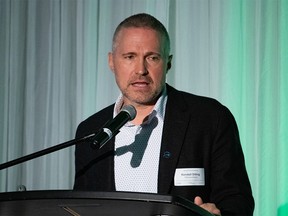
Denis Painchaud doesn’t need to look at a calendar to figure out precisely how much time is left before the Olympics of the global oil and gas industry touch down in Calgary.
“We have 53 days,” the chief executive of the 24th World Petroleum Congress replied Wednesday, without missing a beat.
“There’s lots of work left to do, but the organization is really well structured and organized, and everybody knows what they have to deliver.”
What the group has vowed to deliver is a five-day global energy conference running from Sept. 17 to 21 that is expected to draw more than 5,000 delegates from 100-plus countries, along with 750 international media. It’s focusing on the petroleum industry’s future as the world careens through a bumpy energy transition, while contending with growing concerns about climate change, energy security and affordability.
The list of keynote speakers is shaping up and now includes Haitham Al Ghais, the secretary-general of the Organization of Petroleum Exporting Countries (OPEC), along with the CEO of the world’s largest oil company, Amin Nasser of Saudi Aramco.
ExxonMobil CEO Darren Woods, Repsol’s chief executive Josu Jon Imaz, and federal Natural Resources Minister Jonathan Wilkinson are also expected to speak at the summit, to be held at the BMO Centre and Stampede grounds. (The opening ceremonies are occurring downtown at the Telus Convention Centre.)
“These are some of the big names in energy,” said Jackie Forrest, executive director of Calgary-based ARC Energy Research Institute.
“It is really important to bring people together to hear perspectives. We’re at the cusp of real capital being spent on cleaning up oil and gas, and much more capital going toward clean energy. So it’s a great time to hear these perspectives.”
With the world acutely focused on decarbonization, ESG considerations, the affordability of energy and the need for secure supplies, the conference — usually held every three years in a different city — will provide insights into where the sector expects to move during a period of volatility.
“We do believe there’s some really strong star power that will attract attention,” said Painchaud. “It’s a once-in-a-25-year opportunity for Canada to tell its story to a global audience.”
Recommended from Editorial
-

Rocky the red moose to welcome delegates to World Petroleum Congress
-

Varcoe: World Petroleum Council set to transition name ‘to move with the times’
-

Calgary police to bolster resources for World Petroleum Congress
The event was last held in Calgary in 2000. As the world’s fourth-largest oil producer — with the third-largest proven crude reserves on the planet — Canada has plenty to talk about, but also a lot to learn as the international industry moves through a profound transformation.
Questions abound about when the world might reach peak oil demand in the coming years — or decades — as electric vehicles expand in popularity. Government climate policies to cut emissions from fossil fuel use, and the adoption of net-zero targets around the world, are gaining momentum.
Earlier this week, OPEC’s secretary general told the G20 energy ministers’ meeting that by 2045, global energy demand will increase by 23 per cent. However, to meet this growing appetite, the industry must invest an estimated US$12 trillion by 2045, even as there are increasing calls to end oil-project financing, said Al Ghais.
This is a singularly unique period of time for the conference.
“We are at a massive crossroads. Clearly, the world is moving to a low carbon future and that’s a massive shift for us as producers, and also for consumers and heavy industry,” said Pathways Alliance president Kendall Dilling, a speaker at the conference who also represents a group of oilsands producers working to reach net-zero emissions.
“That is the challenge ahead of us for the next decade or decades. And it very much is a pivotal point in the industry.”

The theme of this year’s congress is “Energy Transition: The Path to Net Zero.”
And earlier this month, the World Petroleum Council, which organizes the triennial congress, officially announced a name change.
Founded in 1933, it will now be known as WPC Energy, which “reflects the organization’s commitment to lead the global transition to a low-carbon energy system,” it said in a statement.
The Calgary event won’t alter its name, given the short amount of time before the World Petroleum Congress is held in the fall.
Hosting the event is expected to bring around US$75 million of economic activity to the city, filling up hotel rooms and restaurants, while a small army of more than 400 volunteers — expected to top 750 by September — will be needed to pull it all together.

Aside from the economic benefits, the conference will provide a chance for Canadians and other energy leaders to share information about what’s being done to decarbonize the sector and meet the needs of consumers, said Richard Masson, chair of the World Petroleum Council Canada.
“The world has energy security issues right now, energy affordability issues, and we’re trying to get to a common goal on climate change,” he said.
“Easy answers would be great if they worked, but there aren’t easy answers. And it will take all kinds of efforts by many, many organizations to deal with the climate challenge we have, while still providing secure energy.
“That’s what this is about — and Canada is a great place for it.”
Chris Varcoe is a Calgary Herald columnist.
You can read more of the news on source
